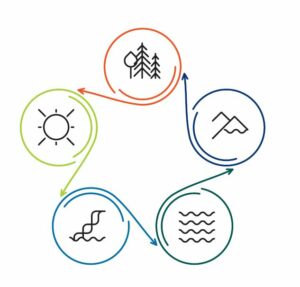Interweavings: Introducing CO[I]IL

Collaborative Online Indigenous Intercultural Learning or CO[I]IL is an Indigenous-focused virtual exchange whereby two or more faculty based in different countries and institutions collaborate to develop a series of synchronous and asynchronous activities for their students. Students complete the activities in international teams using digital collaboration and communication tools.
CO[I]IL uses technology and the Internet to bring diverse faculty and students together—across borders of
time, space, language, culture, and discipline—to engage in peer-to-peer intercultural dialogue and
meaningful projects, that support developing intercultural fluency and an understanding of different cultural contexts.
Since CO[I]IL is embedded within the curriculum, participating students gain access to the world and its diversity within the classroom. Scroll down to find out more, or download the following PDF for more information: Interweavings Introducing CO[I]IL
Traditional COIL versus Collaborative Online Indigenous Intercultural Projects
While traditional Collaborative Online Intercultural (or International) Learning projects focus on providing students and instructors with in-class international and intercultural experiences, CO[I]IL goes one step further by developing Indigenous-focused local community-based projects, interweaving both local and global perspectives.
Traditional COIL projects have four key dimensions:
- teachers and students collaborate within and across classrooms
- online technology and interaction are essential components
- international and intercultural learning is central
- the project is integrated into existing credit-bearing courses
For a brief introduction to COIL, watch the following 3‑minute video.
How CO[I]Il is Different
Interweaving the Indigenous and the Intercultural
Collaborative Online Indigenous Intercultural Learning (CO[I]IL) is founded on the following guiding principles:
- a non-Indigenous instructor and an Indigenous instructor come together in a partnership of collaboration and reciprocity
- the project reflects and integrates Indigenous pedagogical approaches, (see Facilitating online learning with the 5R’s: Embedding Indigenous Pedagogy into the Online Space based on Kirkness & Barnhardt’s (1991) 4R’s of Indigenous pedagogy as a starting point and also seek out local resources where available)
- the project prioritizes the needs of Indigenous communities local to each institution, ensuring that final class projects benefit these communities
- both faculty and students engage with Indigenous communities local to each partner institution, focusing on the needs of the local community
The CO[I]IL Pathway
The CO[I]IL Pathway guides instructors through every step of the CO[I]IL experience, allowing teachers to enter the process at the point most appropriate for them, encouraging an iterative and ongoing cycle of learning, engagement, and reflection.
This Pathway interweaves Indigenous pedagogies, intercultural perspectives, and land-based approaches with academic expectations and can be adapted to the priorities of any community/context within which the Pathway is utilized.
“Central to the Pathway and important at each step, is the focus on the local, on relationship building, and reciprocity.”
This collaborative Pathway is evolving through dialogue with stakeholders and communities across five BC partner institutions, along with international partner institutions.
Drawing on existing expertise within the network ensures intercultural competencies and agreed-upon Indigenous pedagogical approaches are prioritized, in culturally appropriate ways across contexts, to ensure local communities remain at the center. Inherent within Indigenous ways of knowing and integral to the Pathway are the Sustainable Development Goals (SDGs). Considering the SDGs in CO[I]IL project development enhances our ability to connect with Indigenous priorities and goals on a local and global level.
At the heart of this CO[I]IL Pathway lies the commitment to reconciliation, decolonization, and Indigenization, with the voices of Indigenous communities leading the conversations.
The Pathway takes faculty through the following steps:
- Positioning: Walking in a Good Way
- Interweaving: Braiding the Indigenous and the Intercultural
- Community Building: Co-creating Projects
- Connecting through Kinship: Engaging in CO[I]IL
- Reflecting and Reciprocity: Moving Forward in Reflective Circles
Positioning: Walking in a Good Way
This requires rigorous and ongoing self-reflection, vulnerability, and a willingness to shift and grow through mistake-making and experiential learning. Walking in a good way means:
- understanding our own story and connection to the land
- honoring the local: prioritizing the land we walk on
- reflecting on your heart and spirit
Interweaving: Braiding the Indigenous and the Intercultural
Interweaving refers to how Indigenous perspectives and ways of teaching are interwoven with intercultural perspectives and ways of teaching, within a CO[I]IL project. This process includes:
- exploring what it means to be Indigenous-focused
- developing intercultural fluency
- braiding different ways of knowing and being: interweaving the Indigenous and the intercultural
Community Building: Co-creating Projects
This means ensuring land-based learning remains at the center of the Indigenous-focused online project. It means acknowledging and honoring the lands local to those participating in the project (at home and overseas) and seeking guidance from local knowledge keepers and others, to ensure we make appropriate and respectful connections with local Indigenous communities as we co-create projects that focus on what is important to the people on whose lands we walk. It includes:
- working well with local Indigenous communities to identify a project
- choosing an international partner
- getting practical — understanding CO[I]IL logistics
Connecting through Kinship: Engaging in CO[I]IL
Students and instructors across classrooms work to foster community and connection before students begin on their joint exploration. This begins by:
- coming together through ‘Stories of who I am’
- engaging in local community-based projects
- learning from each other
Reflecting and Reciprocity: Moving Forward in Reflective Circles
This step recognizes the ongoing and iterative nature of CO[I]IL and is an opportunity to demonstrate an ongoing commitment to developing Indigenous-and intercultural-focused pedagogies and practices. It involves:
- reflecting on the path we took
- reflecting on our new story
- giving back and moving forward: contemplating the next steps in our CO[I]IL journey
In the next sections, we’ll explore each of the above steps in more detail.